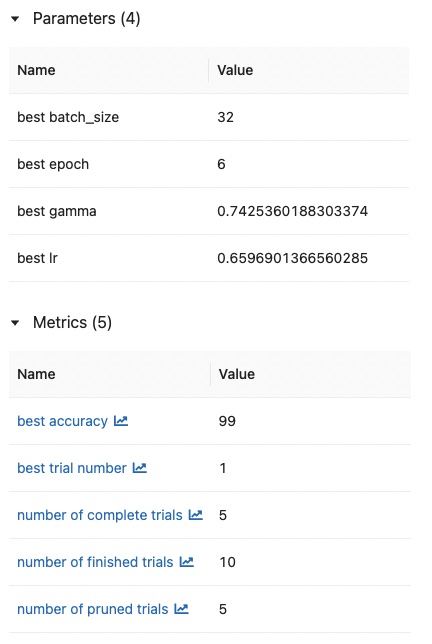This repository contains an example program to train a deep neural network to classify handwritten digits from the MNIST dataset.
In particular, it showcases the following points:
- MLflow to log the experiments and models.
- PyTorch DistributedDataParallel to run the model on multiple nodes.
- Optuna for automatic hyperparameter tuning.
Install Mlflow by issuing the following command
pip install mlflowIf you want to run a local instance of the MLflow server, we first create a directory where to
store the mlflow database, called mlflow in this example, and run it like this:
mkdir mlflow
mlflow server --backend-store-uri sqlite:///mlflow/dabase.sqlite --default-artifact-root mlflow/Otherwise, just point at the MLflow address in the main.py file.
Install pre-requisites by issuing the following commands
pip install optuna
pip install plotly # optional for plot summaryThis example uses PyTorch's DistributedDataParallel (DDP) for model parallelization across nodes.
In order to run this example, type:
torchrun --standalone --nproc_per_node=4 main.pyThen, connecto to the MLflow address (by default localhost:5000) and you should find an experiment
named MNIST-PyTorch-Tune on the left panel.
After selecting the experiment, all the runs should will appear there.
You can set the parameters for tuning by modifying the get_hyperparams function in main.py.
If you want to set a different number of tuning trials, run the code with the additional argument --n-trials N
Thanks to DDP, all experiments will run on multiple nodes, their results will be logged in the MLflow dashboard, and Optuna will automatically find the best hyperparameters. Note that Optuna will only run a trial to its completion if the starting point proves to be good, otherwise it will stop the trial and start another one with different hyperparameters.
When all trials are done, a new run named summary will be created. It contains the details about the hyperparameters that led to the best test accuracy.
It will also generate some nice-looking figures for easy visualization.


